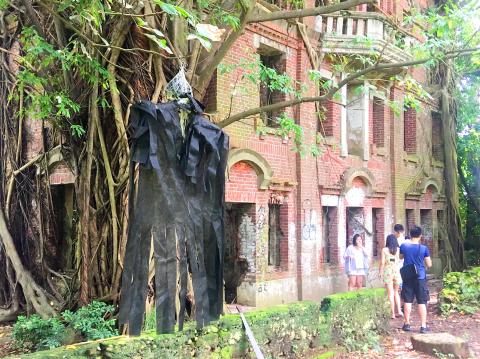Voted the nation’s best haunted mansion in a poll on Yahoo Taiwan, the Liu family mansion in Chiayi County has had even more visitors this month, the seventh month of the lunar calendar, or Ghost Month.
According to traditional Chinese beliefs, spirits of the dead are released into the mortal realm during Ghost Month. Every day, offerings to these spirits can be observed on almost any street.
The Liu mansion in Minsyong Township (民雄) was built during the Japanese colonial era, but it was abandoned shortly after being completed, making way for many ghost stories.

Photo: Tsai Tsung-hsun, Taipei Times
According to a local myth, the owner had an affair with a maid, who, after being abused by the wife, drowned herself in the mansion’s well.
Another tale says that a Japanese soldier killed himself when staying the night, while others say there were “unmistakable” occult disturbances when the Chinese Nationalist Party (KMT) army set up camp near the mansion.
A visitor, surnamed Ho (何), said that he was starting off Ghost Month — which this year began on Thursday last week — by visiting haunted houses, and that he traveled from Taichung to Minsyong because the Liu mansion is the most famous.
Ho said that the overgrown Baroque-style ruins have an eeriness to them, but he did not feel scared.
“But it might be because I visited in the morning,” he added.

The High Prosecutors’ Office yesterday withdrew an appeal against the acquittal of a former bank manager 22 years after his death, marking Taiwan’s first instance of prosecutors rendering posthumous justice to a wrongfully convicted defendant. Chu Ching-en (諸慶恩) — formerly a manager at the Taipei branch of BNP Paribas — was in 1999 accused by Weng Mao-chung (翁茂鍾), then-president of Chia Her Industrial Co, of forging a request for a fixed deposit of US$10 million by I-Hwa Industrial Co, a subsidiary of Chia Her, which was used as collateral. Chu was ruled not guilty in the first trial, but was found guilty

DEADLOCK: As the commission is unable to forum a quorum to review license renewal applications, the channel operators are not at fault and can air past their license date The National Communications Commission (NCC) yesterday said that the Public Television Service (PTS) and 36 other television and radio broadcasters could continue airing, despite the commission’s inability to meet a quorum to review their license renewal applications. The licenses of PTS and the other channels are set to expire between this month and June. The National Communications Commission Organization Act (國家通訊傳播委員會組織法) stipulates that the commission must meet the mandated quorum of four to hold a valid meeting. The seven-member commission currently has only three commissioners. “We have informed the channel operators of the progress we have made in reviewing their license renewal applications, and

‘DENIAL DEFENSE’: The US would increase its military presence with uncrewed ships, and submarines, while boosting defense in the Indo-Pacific, a Pete Hegseth memo said The US is reorienting its military strategy to focus primarily on deterring a potential Chinese invasion of Taiwan, a memo signed by US Secretary of Defense Pete Hegseth showed. The memo also called on Taiwan to increase its defense spending. The document, known as the “Interim National Defense Strategic Guidance,” was distributed this month and detailed the national defense plans of US President Donald Trump’s administration, an article in the Washington Post said on Saturday. It outlines how the US can prepare for a potential war with China and defend itself from threats in the “near abroad,” including Greenland and the Panama

Taiwan People’s Party (TPP) Chairman Huang Kuo-chang (黃國昌) yesterday appealed to the authorities to release former Taipei mayor Ko Wen-je (柯文哲) from pretrial detention amid conflicting reports about his health. The TPP at a news conference on Thursday said that Ko should be released to a hospital for treatment, adding that he has blood in his urine and had spells of pain and nausea followed by vomiting over the past three months. Hsieh Yen-yau (謝炎堯), a retired professor of internal medicine and Ko’s former teacher, said that Ko’s symptoms aligned with gallstones, kidney inflammation and potentially dangerous heart conditions. Ko, charged with